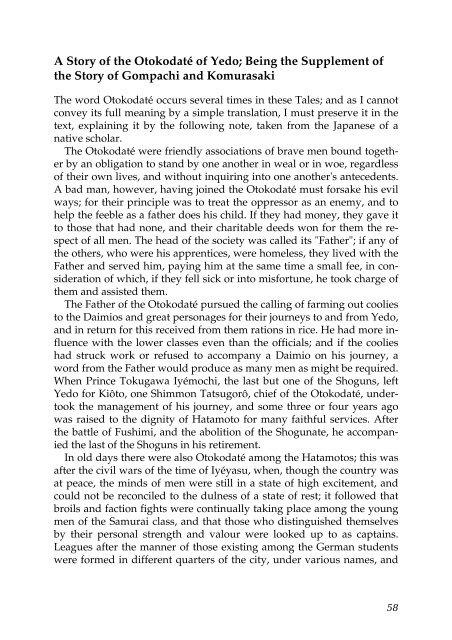You also want an ePaper? Increase the reach of your titles
YUMPU automatically turns print PDFs into web optimized ePapers that Google loves.
A Story <strong>of</strong> the Otokodaté <strong>of</strong> Yedo; Being the Supplement <strong>of</strong><br />
the Story <strong>of</strong> Gompachi and Komurasaki<br />
The word Otokodaté occurs several times in these <strong>Tales</strong>; and as I cannot<br />
convey its full meaning by a simple translation, I must preserve it in the<br />
text, explaining it by the following note, taken from the <strong>Japan</strong>ese <strong>of</strong> a<br />
native scholar.<br />
The Otokodaté were friendly associations <strong>of</strong> brave men bound together<br />
by an obligation to stand by one another in weal or in woe, regardless<br />
<strong>of</strong> their own lives, and without inquiring into one another's antecedents.<br />
A bad man, however, having joined the Otokodaté must forsake his evil<br />
ways; for their principle was to treat the oppressor as an enemy, and to<br />
help the feeble as a father does his child. If they had money, they gave it<br />
to those that had none, and their charitable deeds won for them the respect<br />
<strong>of</strong> all men. The head <strong>of</strong> the society was called its "Father"; if any <strong>of</strong><br />
the others, who were his apprentices, were homeless, they lived with the<br />
Father and served him, paying him at the same time a small fee, in consideration<br />
<strong>of</strong> which, if they fell sick or into misfortune, he took charge <strong>of</strong><br />
them and assisted them.<br />
The Father <strong>of</strong> the Otokodaté pursued the calling <strong>of</strong> farming out coolies<br />
to the Daimios and great personages for their journeys to and from Yedo,<br />
and in return for this received from them rations in rice. He had more influence<br />
with the lower classes even than the <strong>of</strong>ficials; and if the coolies<br />
had struck work or refused to accompany a Daimio on his journey, a<br />
word from the Father would produce as many men as might be required.<br />
When Prince Tokugawa Iyémochi, the last but one <strong>of</strong> the Shoguns, left<br />
Yedo for Kiôto, one Shimmon Tatsugorô, chief <strong>of</strong> the Otokodaté, undertook<br />
the management <strong>of</strong> his journey, and some three or four years ago<br />
was raised to the dignity <strong>of</strong> Hatamoto for many faithful services. After<br />
the battle <strong>of</strong> Fushimi, and the abolition <strong>of</strong> the Shogunate, he accompanied<br />
the last <strong>of</strong> the Shoguns in his retirement.<br />
In old days there were also Otokodaté among the Hatamotos; this was<br />
after the civil wars <strong>of</strong> the time <strong>of</strong> Iyéyasu, when, though the country was<br />
at peace, the minds <strong>of</strong> men were still in a state <strong>of</strong> high excitement, and<br />
could not be reconciled to the dulness <strong>of</strong> a state <strong>of</strong> rest; it followed that<br />
broils and faction fights were continually taking place among the young<br />
men <strong>of</strong> the Samurai class, and that those who distinguished themselves<br />
by their personal strength and valour were looked up to as captains.<br />
Leagues after the manner <strong>of</strong> those existing among the German students<br />
were formed in different quarters <strong>of</strong> the city, under various names, and<br />
58



